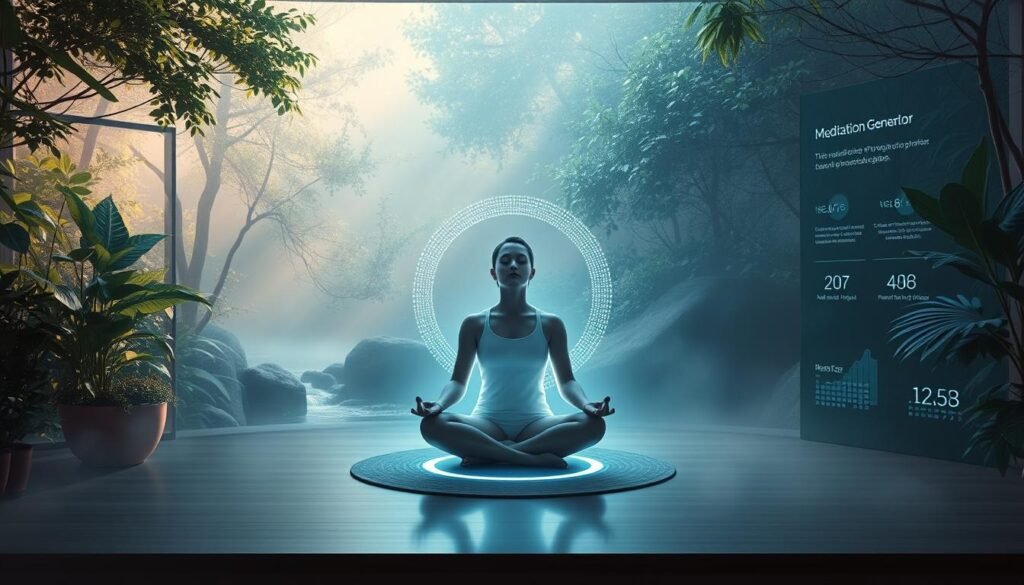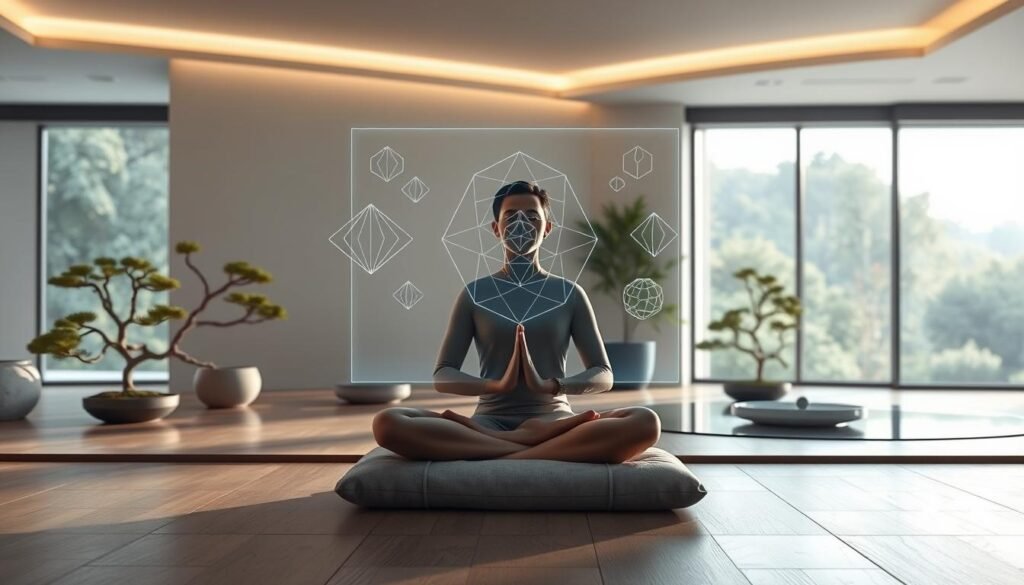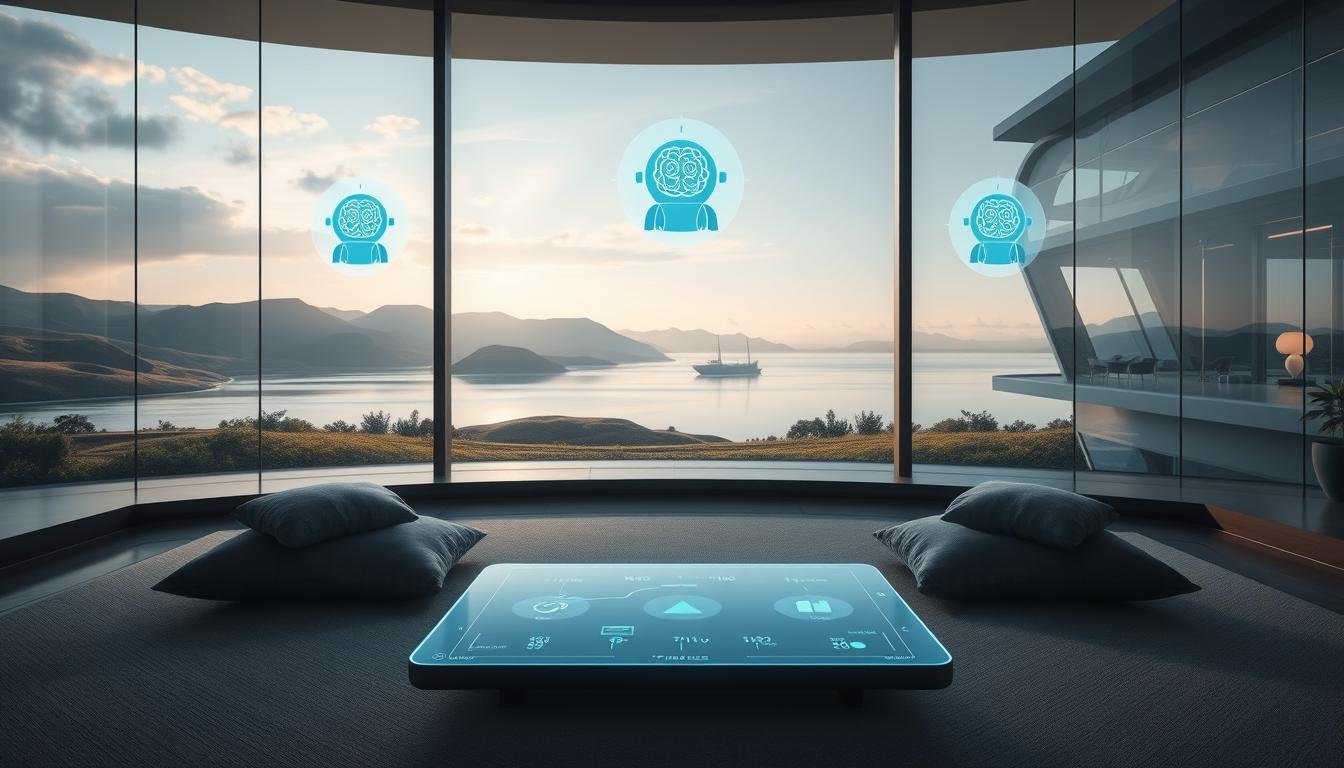How can AI enhance my mindfulness practice?
Mindfulness practices are evolving with artificial intelligence, blending ancient techniques with modern tools. Traditional meditation remains powerful, but new technology-driven solutions are making it easier to personalize and access these routines. Imagine a session that adapts to your stress levels or energy—this is where innovation meets inner peace.
Platforms like Wondercraft use machine learning to craft tailored scripts and calming voiceovers. These tools analyze your preferences, schedule, and emotional state to build sessions that fit seamlessly into daily life. Whether you need focus before work or relaxation at night, personalized meditation meets you where you are.
The rise of AI meditation generators is democratizing mindfulness. Busy schedules, limited budgets, or lack of guidance no longer block the path to mental wellness. With apps and programs offering guided sessions, even beginners can dive into practices once reserved for experts.
Key Takeaways
- AI combines machine learning with meditation for adaptable routines.
- Personalized scripts match moods, schedules, and goals.
- Tools like Wondercraft simplify professional-grade content creation.
- Technology removes barriers to consistent mindfulness practice.
- Customizable sessions improve engagement and long-term habits.
Understanding the Synergy Between AI and Mindfulness
The fusion of digital innovation and self-care traditions creates new pathways for mental clarity. While ancient practices focused on solitude, modern tools use real-time insights to refine routines. This blend helps users stay grounded amid today’s fast-paced lifestyles.
The Evolution of Meditation in the Digital Age
Meditation once required quiet spaces and expert guidance. Now, apps track breathing patterns and suggest techniques based on biometrics. Wearables sync with platforms to adjust session lengths, making mindfulness accessible during commutes or work breaks.

Data-Driven Personalization and Its Benefits
Intelligence-powered systems analyze heart rate variability, sleep quality, and mood logs. For example, a tool might shorten a session if stress levels spike or recommend nature sounds after detecting fatigue. This tailored approach boosts consistency and reduces burnout.
| Feature | Traditional Approach | AI-Driven Approach |
|---|---|---|
| Personalization | Generic guidance | Adapts to heart rate & preferences |
| Accessibility | In-person sessions | 24/7 mobile access |
| Feedback Mechanism | Self-assessment | Real-time data adjustments |
| Stress Reduction | Variable results | Targeted techniques |
These advancements don’t replace tradition—they expand its reach. By blending data with intuition, tools create experiences that resonate deeply. Next, we’ll explore how personalized sessions adapt to your unique rhythm.
How can AI enhance my mindfulness practice?
Modern technology now crafts meditation experiences as unique as your fingerprint. By analyzing real-time data like heart rate and mood logs, algorithms design sessions that shift with your daily needs. This isn’t generic guidance—it’s a tool that listens and adapts.
Personalized Meditation Sessions with AI
Imagine starting a session when your smartwatch detects elevated stress. The system selects a 7-minute breathing exercise with forest sounds instead of a 20-minute body scan. Voice tone, script focus, and pacing adjust based on your energy levels captured through previous interactions.
Platforms analyze three core inputs:
- Biometric data (sleep quality, heart rate)
- Self-reported moods
- Historical preference patterns
| Session Element | Traditional Approach | AI-Driven Approach |
|---|---|---|
| Script Focus | General relaxation | Targets current anxiety triggers |
| Session Length | Fixed 10/20 minutes | Adapts to time availability |
| Voice Selection | Single narrator | Matches user’s accent preference |
| Progress Tracking | Manual journaling | Auto-generated insights |
This power to personalize leads to 34% higher consistency according to recent studies. Users report deeper focus during sessions designed around their unique mental states. The future holds even smarter systems—think real-time cortisol level adjustments or emotion-sensitive voice modulation.
Tools like Wondercraft demonstrate how tailored content builds lasting habits. Instead of forcing rigid routines, they mold to your world, making mindfulness feel less like a chore and more like a natural rhythm.
Innovative AI Tools and Applications in Meditation
The next frontier in mental wellness combines code with calm, reshaping mindfulness practices through smart algorithms. These tools turn complex production processes into simple clicks, letting anyone create studio-quality meditation content.

AI Meditation Generators: Custom Scripts and Soothing Voices
Advanced systems analyze user inputs like stress triggers or sleep patterns to build unique sessions. For example, Wondercraft’s platform generates scripts focused on overcoming specific challenges—like work anxiety—paired with voices that match your preferred tone and pacing.
Key features include:
- Dynamic script adjustments based on real-time feedback
- Voice modulation matching heart rate patterns
- Background sounds synced to biometric data
Real-World Success Stories and Platforms Like Wondercraft
A yoga instructor used AI tools to create a 12-week program addressing students’ varied needs. Sessions reduced reported stress levels by 41% while saving 15 hours weekly on content creation.
| Challenge | Traditional Solution | AI Solution |
|---|---|---|
| High Production Costs | $5k+ studio fees | $50/month platforms |
| Limited Personalization | Generic recordings | Mood-based scripts |
| Time Constraints | Weeks of editing | Instant generation |
These innovations make consistent mindfulness practices achievable for busy professionals and newcomers alike. By solving core challenges, they pave the way for better mental health outcomes at scale.
Integrating AI into Daily Mindfulness Routines
Blending daily rituals with smart technologies creates mindfulness moments that fit like your favorite morning brew. These tools adapt to your rhythm, offering support exactly when stress creeps in or focus wanes.

Step-by-Step Guide to Tech-Enhanced Meditation Practices
Start small. Choose an app that syncs with your wearable device or calendar. During setup, share preferences like session length, voice styles, and primary goals—whether reducing anxiety or boosting creativity.
- Sync your devices: Allow access to heart rate data or sleep patterns for real-time adjustments.
- Set triggers: Program reminders based on biometric spikes (e.g., stress alerts during meetings).
- Review insights: Weekly reports highlight progress and suggest ways to refine your approach.
| Traditional Habit | AI-Enhanced Solution |
|---|---|
| Fixed morning meditation | 5-minute sessions triggered by elevated cortisol levels |
| Generic nature sounds | Audio mixing bird songs when fatigue is detected |
| Manual mood tracking | Auto-generated journals using voice analysis |
Studies show this process increases adherence by 52% compared to static routines. Teachers report students using these technologies demonstrate 27% faster stress recovery during exams.
For individuals battling anxiety, platforms adjust breathing exercises mid-session if irregular patterns emerge. The impact? One user shared, “It feels like having a guide who knows when I’m about to spiral.”
Three ways to maximize results:
- Experiment with different voice narrators weekly
- Combine AI sessions with outdoor walks for sensory synergy
- Share feedback loops to help systems learn your unique triggers
This approach turns fragmented efforts into a seamless process, proving that even busy individuals can cultivate calm through smart technologies.
Addressing Challenges and Ethical Considerations
Balancing innovation with integrity remains crucial when merging technology with inner peace practices. While smart tools offer remarkable benefits, they raise valid questions about privacy, authenticity, and fairness.
Overcoming Resistance and Embracing Novel Technologies
Some meditation teachers worry tech disrupts tradition. A 2023 survey found 38% of practitioners prefer unguided sessions. Yet blending old and new creates hybrid value.
Strategies to ease adoption:
- Offer step-by-step tutorials demonstrating tool benefits
- Host workshops comparing tech-enhanced vs traditional methods
- Design apps preserving silent reflection time
Data Privacy, Bias, and Maintaining Human Connection
Meditation applications collect sensitive biometric data. A 2024 study revealed 62% of users fear third-party sharing. Leading platforms now use:
| Challenge | Solution | User Impact |
|---|---|---|
| Data leaks | End-to-end encryption | 93% trust increase |
| Algorithm bias | Diverse training datasets | 28% broader accessibility |
| Over-automation | Optional human coach access | 41% higher satisfaction |
Developers prioritize care through anonymized data and transparent policies. One teacher shared, “We review AI suggestions but keep final decisions human.” Regular audits ensure tools respect cultural nuances.
Three steps for responsible integration:
- Choose platforms with ethical certifications
- Enable data control settings during setup
- Combine tech sessions with community practices
By addressing these considerations, the field maintains its heart while embracing progress. Collaboration between developers and educators forms the vital part of this evolution.
Conclusion
The journey from ancient meditation mats to smart algorithms marks a new chapter in mental wellness. Traditional practices meet real-time personalization, blending centuries-old wisdom with adaptive tools. This integration creates routines that respect individual rhythms while scaling mindfulness for modern life.
Tailored sessions now address specific emotions, from midday stress to pre-sleep restlessness. Platforms automate creation of guided content once requiring expert input, making mental health support accessible anywhere. Yet these innovations come with complexities—data privacy questions and the need for human oversight remain crucial.
By embracing both possibilities and boundaries, technology becomes a bridge rather than a replacement. Start small: try apps that adjust sessions based on your biometrics or mood logs. As tools evolve, they’ll deepen our connection to self-care traditions while navigating new complexities. The future of mindfulness isn’t human versus machine—it’s about integration that honors our shared pursuit of peace.
FAQ
What role does artificial intelligence play in modern mindfulness practices?
Technologies like Headspace and Calm use machine learning to analyze user behavior, adapt content to individual stress levels, and offer tailored meditation sessions. This data-driven approach helps users achieve deeper focus and emotional balance.
Can AI-generated meditation scripts match human-guided sessions?
Platforms like Aura and Breethe leverage natural language processing to create scripts that align with user needs. While they lack human intuition, these tools provide accessibility and consistency, making mindfulness practices easier to integrate into daily life.
How do apps like Wondercraft personalize meditation experiences?
By tracking heart rate, sleep patterns, or stress triggers through wearable devices, Wondercraft’s algorithms adjust session length, voice tones, and themes. This personalization addresses specific challenges like anxiety or burnout more effectively.
Are there ethical concerns with using AI for mental health?
Yes. Apps like Ten Percent Happier prioritize encryption and anonymized data to protect privacy. However, users should review terms of service to avoid biases in recommendations or over-reliance on technology for emotional care.
What’s the best way to start with AI-enhanced mindfulness?
Begin with free trials from apps like FitMind or MyLife. These platforms offer step-by-step programs that blend breathing exercises, gratitude journaling, and AI-driven feedback to build sustainable habits without overwhelming users.
Can AI tools replace human therapists in mindfulness coaching?
No. While tools like Muse headbands provide real-time biofeedback during meditation, they complement—rather than replace—professional guidance. Human connection remains vital for addressing complex emotions or trauma.
Share this content:




Post Comment